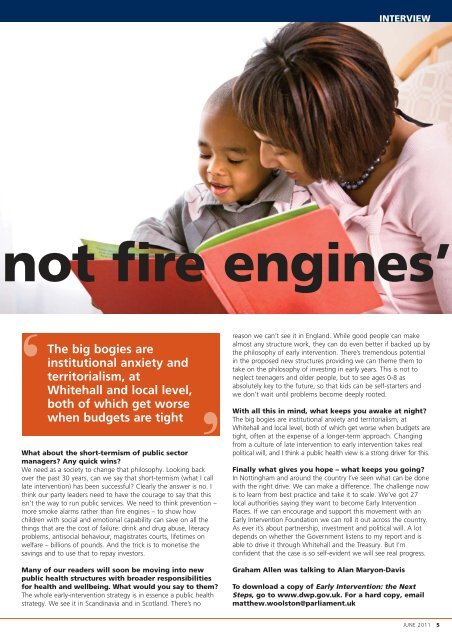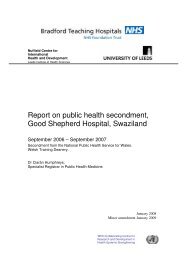PHT June 2011_Jan 10 - UK Faculty of Public Health
PHT June 2011_Jan 10 - UK Faculty of Public Health
PHT June 2011_Jan 10 - UK Faculty of Public Health
You also want an ePaper? Increase the reach of your titles
YUMPU automatically turns print PDFs into web optimized ePapers that Google loves.
INTERVIEW<br />
not fire engines’<br />
The big bogies are<br />
institutional anxiety and<br />
territorialism, at<br />
Whitehall and local level,<br />
both <strong>of</strong> which get worse<br />
‘when budgets are tight<br />
‘<br />
What about the short-termism <strong>of</strong> public sector<br />
managers? Any quick wins?<br />
We need as a society to change that philosophy. Looking back<br />
over the past 30 years, can we say that short-termism (what I call<br />
late intervention) has been successful? Clearly the answer is no. I<br />
think our party leaders need to have the courage to say that this<br />
isn’t the way to run public services. We need to think prevention –<br />
more smoke alarms rather than fire engines – to show how<br />
children with social and emotional capability can save on all the<br />
things that are the cost <strong>of</strong> failure: drink and drug abuse, literacy<br />
problems, antisocial behaviour, magistrates courts, lifetimes on<br />
welfare – billions <strong>of</strong> pounds. And the trick is to monetise the<br />
savings and to use that to repay investors.<br />
Many <strong>of</strong> our readers will soon be moving into new<br />
public health structures with broader responsibilities<br />
for health and wellbeing. What would you say to them?<br />
The whole early-intervention strategy is in essence a public health<br />
strategy. We see it in Scandinavia and in Scotland. There’s no<br />
reason we can’t see it in England. While good people can make<br />
almost any structure work, they can do even better if backed up by<br />
the philosophy <strong>of</strong> early intervention. There’s tremendous potential<br />
in the proposed new structures providing we can theme them to<br />
take on the philosophy <strong>of</strong> investing in early years. This is not to<br />
neglect teenagers and older people, but to see ages 0-8 as<br />
absolutely key to the future, so that kids can be self-starters and<br />
we don’t wait until problems become deeply rooted.<br />
With all this in mind, what keeps you awake at night?<br />
The big bogies are institutional anxiety and territorialism, at<br />
Whitehall and local level, both <strong>of</strong> which get worse when budgets are<br />
tight, <strong>of</strong>ten at the expense <strong>of</strong> a longer-term approach. Changing<br />
from a culture <strong>of</strong> late intervention to early intervention takes real<br />
political will, and I think a public health view is a strong driver for this.<br />
Finally what gives you hope – what keeps you going?<br />
In Nottingham and around the country I’ve seen what can be done<br />
with the right drive. We can make a difference. The challenge now<br />
is to learn from best practice and take it to scale. We’ve got 27<br />
local authorities saying they want to become Early Intervention<br />
Places. If we can encourage and support this movement with an<br />
Early Intervention Foundation we can roll it out across the country.<br />
As ever it’s about partnership, investment and political will. A lot<br />
depends on whether the Government listens to my report and is<br />
able to drive it through Whitehall and the Treasury. But I’m<br />
confident that the case is so self-evident we will see real progress.<br />
Graham Allen was talking to Alan Maryon-Davis<br />
To download a copy <strong>of</strong> Early Intervention: the Next<br />
Steps, go to www.dwp.gov.uk. For a hard copy, email<br />
matthew.woolston@parliament.uk<br />
JUNE <strong>2011</strong> 5

















